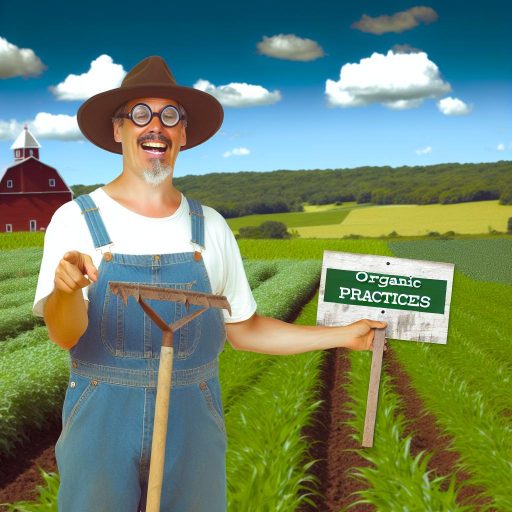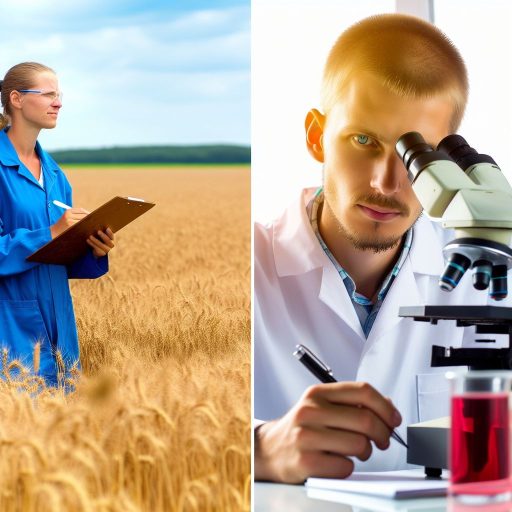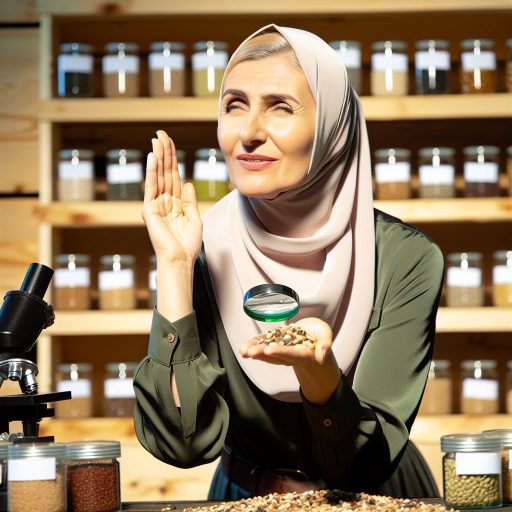Introduction
Pollution control in modern agriculture is crucial for sustainable food production.
It also plays an important role in environmental protection.
This blog post aims to discuss various strategies that can help mitigate pollution.
Negative Effects of Pollution in Agriculture
In recent years, pollution from agricultural activities has caused serious damage.
Runoff from fertilizers, pesticides, and animal waste can contaminate water sources.
These pollutants often harm surrounding ecosystems.
Air pollution results from agricultural machinery and burning of crop residues.
This also contributes to environmental degradation.
Importance of Pollution Control Measures in Agriculture
Controlling pollution in agriculture helps reduce negative environmental impacts.
Farmers can reduce their environmental footprint by adopting better practices.
These measures also protect natural resources for future generations.
Understanding pollution in modern agriculture
Pollution in agriculture refers to the contamination of air, water, and soil by various agricultural practices.
Types of pollution in agriculture affecting air, water, and soil
- Air pollution in agriculture is caused by pesticide and fertilizer drift, burning of crop residues, and emissions from machinery.
- Water pollution in agriculture is mainly due to runoff of pesticides, fertilizers, and animal waste into water bodies.
- Soil pollution in agriculture is the result of excessive use of chemicals, heavy metals, and improper waste disposal.
Environmental and health impacts of agricultural pollution
- Pollution in agriculture can lead to soil degradation, loss of biodiversity, contamination of water sources, and air quality issues.
- Human health risks from agricultural pollution include exposure to toxic chemicals, respiratory problems, and waterborne diseases.
- Furthermore, pollution in agriculture can also affect wildlife, aquatic ecosystems, and overall environmental sustainability.
Strategies for controlling pollution in modern agriculture
Implementing integrated pest management (IPM) reduces pesticide use by adopting crop rotation, biological pest control, and resistant crop varieties.
Using precision agriculture tools like GPS-guided machinery, drones, and soil sensors optimizes input use and lowers pollution.
Practices such as no-till farming, cover cropping, and composting improve soil health and decrease contamination risks.
Developing nutrient management plans based on soil testing helps farmers apply fertilizers efficiently and reduce runoff.
Conservation tillage methods like strip-till or mulch-till minimize soil disturbance and erosion, preserving soil quality.
Water conservation techniques including drip irrigation, rainwater harvesting, and water recycling reduce water pollution risks.
Creating buffer zones along water bodies or sensitive areas traps pollutants and prevents environmental contamination.
Transitioning to organic farming avoids synthetic chemicals and uses natural inputs, lowering pollution levels.
Transform Your Career Today
Unlock a personalized career strategy that drives real results. Get tailored advice and a roadmap designed just for you.
Start NowProper management of agricultural waste via composting, recycling, or appropriate disposal minimizes pollution impacts.
Addressing pollution in agriculture requires a holistic approach combining sustainable practices, innovative technologies, and regulatory measures.
By applying pollution control strategies, farmers can protect the environment, safeguard human health, and ensure long-term agricultural sustainability.
Sustainable farming practices are essential to reduce pollution in agriculture.
Farmers can adopt various strategies such as:
Use of Organic Farming Methods
Organic farming involves avoiding synthetic chemicals like pesticides and fertilizers.
This method helps in reducing chemical runoff and its impact on the environment.
Crop Rotation and Diversification
Rotating crops helps in replenishing soil nutrients naturally.
It reduces the need for chemical fertilizers.
Diversification also minimizes the risk of pests and diseases.
Integrated Pest Management
Integrated Pest Management (IPM) focuses on controlling pests through natural means like introducing beneficial insects or using traps.
This reduces the reliance on chemical pesticides.
The adoption of sustainable farming practices is crucial in modern agriculture to minimize pollution and promote environmental sustainability.
Explore Further: Livestock Manager Certification Programs
One of the key pollution control strategies in modern agriculture is precision farming techniques.
Use of Technology
One important aspect of precision farming is the use of technology such as GPS and drones.
These tools allow farmers to precisely target areas that need attention.
This reduces the overall use of resources.
Monitoring and Managing Resources Efficiently
By using precision farming techniques, farmers can monitor and manage their resources more efficiently.
This helps to reduce waste and pollution.
Transform Your Career Today
Unlock a personalized career strategy that drives real results. Get tailored advice and a roadmap designed just for you.
Start NowFarmers can maximize the productivity of the land.
Reducing the Use of Chemicals and Fertilizers
Another benefit of precision farming is the ability to reduce the use of chemicals and fertilizers.
By only applying these inputs where they are needed, farmers can minimize the environmental impact.
This supports sustainable farming operations.
Precision farming techniques enable farmers to optimize their resource use and minimize pollution.
By embracing technology and implementing efficient practices, farmers can protect the environment.
These efforts ensure the sustainability of their agricultural operations.
See Related Content: Rangeland Management Strategies for Sustainable Grazing
Benefits of Combining Trees with Crops in Modern Farming
Implementing agroforestry in modern agriculture is becoming increasingly popular.
This approach offers numerous benefits to both farmers and the environment.
Agroforestry involves integrating trees with crops in agricultural practices.
One key benefit is the reduction of soil erosion through natural barriers.
Trees reduce the impact of wind and water erosion on the soil.
By decreasing soil erosion, agroforestry also minimizes water pollution.
Less soil erosion means fewer sediments and pollutants enter water bodies.
This helps improve overall water quality in the environment.
Furthermore, agroforestry promotes biodiversity by providing diverse habitats.
The ecosystems created by trees and crops enhance wildlife diversity on farms.
In addition to environmental gains, agroforestry supports economic sustainability.
Trees produce additional income sources through fruits, nuts, and timber.
Transform Your Career Today
Unlock a personalized career strategy that drives real results. Get tailored advice and a roadmap designed just for you.
Start NowThis diversification improves the financial resilience of farms.
Agroforestry also enhances soil fertility and nutrient cycling on farms.
Trees contribute organic matter, improving soil structure and nutrient content.
The integration of trees and crops plays a role in mitigating climate change.
Trees sequester carbon dioxide, reducing greenhouse gas emissions.
This helps decrease the overall carbon footprint of agricultural activities.
Agroforestry offers a holistic and sustainable approach to modern farming.
It benefits the environment and supports farmers in improving productivity.
Delve into the Subject: Top Tools and Equipment for Rangeland Managers

Cover Crops in Pollution Control Strategies
Utilizing cover crops in modern agriculture plays a crucial role in reducing pollution.
It also promotes sustainable farming practices.
- Role of cover crops in preventing soil erosion
- Improvement of soil health and fertility
- Reduction of nutrient runoff into water bodies
Cover crops help to protect the soil surface from erosion by wind and water.
Their dense foliage acts as a barrier, reducing soil disturbance and preventing loss of topsoil.
This helps maintain soil structure and fertility.
It also ensures long-term productivity of agricultural land.
Cover crops contribute organic matter to the soil as they decompose.
They enrich the soil with essential nutrients and improve its structure.
This enhances soil fertility and promotes beneficial microbial activity.
Cover crops also increase the soil’s capacity to retain water and nutrients.
As a result, overall soil health improves, leading to increased crop yields.
Transform Your Career Today
Unlock a personalized career strategy that drives real results. Get tailored advice and a roadmap designed just for you.
Start NowFarmers can reduce their dependence on chemical fertilizers by using cover crops.
Cover crops play a vital role in reducing nutrient runoff from agricultural fields.
They take up excess nutrients present in the soil, such as nitrogen and phosphorus.
This helps prevent leaching into groundwater or surface water.
Consequently, water quality is protected and risks of algal blooms decrease.
By promoting the use of cover crops, farmers contribute to sustainable farming practices.
They also support environmental conservation efforts.
Learn More: How to Start Your Career as a Pest Control Advisor
Water is a precious resource.
It is essential for agriculture.
Farmers are adopting water conservation methods.
These methods ensure sustainable use of water.
Water conservation methods
- Efficient irrigation techniques such as drip irrigation
- Rainwater harvesting and recycling
- Prevention of water pollution through proper management practices
Benefits of efficient irrigation techniques such as drip irrigation
Drip irrigation delivers water directly to plant roots.
This method minimizes water wastage and maximizes efficiency.
Farmers can reduce water usage by up to 50% compared to traditional methods.
The technique conserves water.
It also leads to higher crop yields.
Plants receive just the right amount of water they need.
Drip irrigation systems are easy to install and maintain.
These systems provide a cost-effective solution for farmers.
Transform Your Career Today
Unlock a personalized career strategy that drives real results. Get tailored advice and a roadmap designed just for you.
Start NowImportance of rainwater harvesting and recycling
Rainwater harvesting captures and stores rainwater for later use.
This technique benefits agricultural activities.
It reduces reliance on groundwater and surface water sources.
Thus, water resources are conserved for the future.
By collecting rainwater, farmers ensure a sustainable water supply for crops.
This supply remains steady even during dry spells.
Recycling rainwater reduces runoff and erosion.
Soil health and crop productivity improve as a result.
Measures to prevent water pollution through proper management practices
Proper management practices prevent water pollution in agriculture.
Farmers can adopt various strategies.
These include minimizing chemical fertilizer and pesticide use.
They also involve proper disposal of agricultural waste.
Implementing erosion control measures is another key strategy.
Reducing harmful chemicals protects water bodies from contamination.
Proper waste management safeguards aquatic ecosystem health.
Sustainable agriculture conserves water and promotes environmental sustainability.
Role of water conservation in sustainable agriculture
Water conservation plays a crucial role in modern agriculture.
Efficient irrigation techniques contribute significantly to conservation efforts.
Rainwater harvesting supports sustainable water supplies.
Pollution prevention measures protect the environment.
Transform Your Career Today
Unlock a personalized career strategy that drives real results. Get tailored advice and a roadmap designed just for you.
Start NowTogether, these practices ensure water supply sustainability for crops.
They also protect the environment for future generations.
Environmental Benefits of Pollution Control in Agriculture
Pollution control strategies in modern agriculture preserve our environment.
Implementing crop rotation helps reduce soil depletion and pollution.
Cover cropping improves soil health and limits erosion effectively.
Integrated pest management minimizes chemical use without harming crops.
Proper waste management prevents contaminants from reaching water and air.
Farmers should prioritize sustainability for healthier ecosystems long term.
Adopting eco-friendly techniques protects soil quality and water resources.
Reducing harmful chemicals ensures cleaner air and safer farming practices.
Strategies for Enhancing Sustainable Farming Practices
All farmers need to take proactive steps to control pollution effectively.
Sustainable methods help mitigate agriculture’s environmental impact considerably.
Everyone should work together to build a greener, healthier planet.
Start today with small changes that create long-lasting positive effects.
Our planet deserves commitment to responsible and eco-friendly farming.




